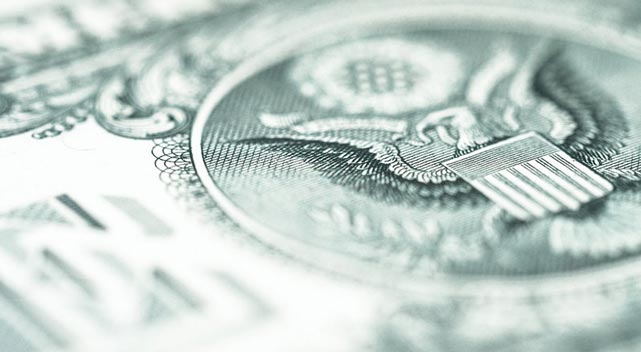Pound to Dollar Week Ahead Forecast: USD Volatility Tipped as Biden Withdraws
- Written by
John Cameron

During the week, the Pound drew support from a shift in yield spreads in favour of the UK currency.
Expectations of a Bank of England August rate cut faded again while markets are now much more confident over a Fed move in September.
The Pound to Dollar (GBP/USD) exchange rate hit a 12-month high above 1.30 before a correction to 1.2920.
Bank of America considers that a sustained GBP/USD move above 1.29, could lead to a medium-term advance to 1.40.
Danske Bank has revised its Pound forecasts higher, but still forecasts a GBP/USD decline to 1.21 on a 12-month view.
Headline UK inflation held at 2.0% for June compared with expectations for a marginal decline to 1.9% while the core rate held at 3.5%.
Importantly, the services-sector remained at 5.7%, well above the Bank of England’s comfort zone.
Overall, markets are now pricing in less than a 50% chance that the Bank of England will cut rates at the August policy meeting.
HSBC commented; “If the central bank decides to keep rates unchanged in August, it should be GBP positive. However, over the medium term we believe the relatively poor growth-inflation mix in the UK compared to the US, should work in the USD’s favor.”
US data releases did not have a major impact.
Overall yield spreads hampered the dollar, but political considerations were a key influence.
Markets considered that the chances of a Trump election victory in November had increased sharply after surviving an assassination attempt.
There was also further pressure for President Biden to withdraw from the Democrat nomination.
Trump called on the Fed not to cut interest rates in September.
Commerzbank looked on the potential ramifications of political pressure on monetary policy; “If the Fed lowers the key interest rate in September, this may be seen as an immediate USD-negative signal. But it would also signal that the Fed is resisting political pressure. And that in turn would be USD-positive, especially in the long term of four upcoming Trump years.”
Credit Agricole notes the possibility of a dollar rebound if expectations are disappointed; “Any potential reality check could in turn lend the USD a hand at some point, while the seasonality also turns more favourable for the USD in August.”
Citigroup expects that A trump victory in November would be positive for the dollar due to the impact trade policy and tariffs together with a more expansionary fiscal policy with stronger growth and higher yields.
It added; “we do not expect markets will actively trade the election until August/September. A “red wave” scenario should be worth +5% for the DXY, and we expect markets will have this fully priced as a likely outcome going into the election itself. Therefore, the USD rally may actually peak into the election, with limited upside follow-through even in the event a “red wave” materializes.”
As this post was updated, Joe Biden announced his withdrawal:
There will also be important implications if the US slides into recession.
According to Citigroup; “recessions tend to start as USD negative events (as softening growth leads to markets pricing a more dovish Fed) but then becomes USD positive events as acute recession concerns start impacting risk markets and increasing volatility.
STORY LINK Pound to Dollar Week Ahead Forecast: USD Volatility Tipped as Biden Withdraws

During the week, the Pound drew support from a shift in yield spreads in favour of the UK currency.
Expectations of a Bank of England August rate cut faded again while markets are now much more confident over a Fed move in September.
The Pound to Dollar (GBP/USD) exchange rate hit a 12-month high above 1.30 before a correction to 1.2920.
Bank of America considers that a sustained GBP/USD move above 1.29, could lead to a medium-term advance to 1.40.
Danske Bank has revised its Pound forecasts higher, but still forecasts a GBP/USD decline to 1.21 on a 12-month view.
Headline UK inflation held at 2.0% for June compared with expectations for a marginal decline to 1.9% while the core rate held at 3.5%.
Importantly, the services-sector remained at 5.7%, well above the Bank of England’s comfort zone.
Save on Your GBP/USD Transfer
Get better rates and lower fees on your next international money transfer. Compare TorFX with top UK banks in seconds and see how much you could save.
HSBC commented; “If the central bank decides to keep rates unchanged in August, it should be GBP positive. However, over the medium term we believe the relatively poor growth-inflation mix in the UK compared to the US, should work in the USD’s favor.”
US data releases did not have a major impact.
Overall yield spreads hampered the dollar, but political considerations were a key influence.
Markets considered that the chances of a Trump election victory in November had increased sharply after surviving an assassination attempt.
There was also further pressure for President Biden to withdraw from the Democrat nomination.
Trump called on the Fed not to cut interest rates in September.
Commerzbank looked on the potential ramifications of political pressure on monetary policy; “If the Fed lowers the key interest rate in September, this may be seen as an immediate USD-negative signal. But it would also signal that the Fed is resisting political pressure. And that in turn would be USD-positive, especially in the long term of four upcoming Trump years.”
Credit Agricole notes the possibility of a dollar rebound if expectations are disappointed; “Any potential reality check could in turn lend the USD a hand at some point, while the seasonality also turns more favourable for the USD in August.”
Citigroup expects that A trump victory in November would be positive for the dollar due to the impact trade policy and tariffs together with a more expansionary fiscal policy with stronger growth and higher yields.
It added; “we do not expect markets will actively trade the election until August/September. A “red wave” scenario should be worth +5% for the DXY, and we expect markets will have this fully priced as a likely outcome going into the election itself. Therefore, the USD rally may actually peak into the election, with limited upside follow-through even in the event a “red wave” materializes.”
As this post was updated, Joe Biden announced his withdrawal:
— Joe Biden (@JoeBiden) July 21, 2024
There will also be important implications if the US slides into recession.
According to Citigroup; “recessions tend to start as USD negative events (as softening growth leads to markets pricing a more dovish Fed) but then becomes USD positive events as acute recession concerns start impacting risk markets and increasing volatility.
International Money Transfer? Ask our resident FX expert a money transfer question or try John's new, free, no-obligation personal service! ,where he helps every step of the way, ensuring you get the best exchange rates on your currency requirements.
TAGS: Pound Dollar Forecasts
Comments are currrently disabled
Related Stories:
- British Pound to Dollar Forecast: GBP Jumps to 11-Week Best on USD Retreat - December 24, 2025
- Pound Sterling to Dollar Forecast: Festive Mood Lifts GBP/USD Toward 2026 - December 23, 2025
- Pound-to-Dollar Forecast: GBP/USD Higher as Rate Outlooks Diverge - December 23, 2025
- Pound to Dollar Price Forecast: GBP Near 1.34 as Markets Bet on BoE Path - December 22, 2025
- Pound to Dollar Rate Pushes Higher, Year-End Forecast 1.34 - December 19, 2025
- GBP/USD Forecast: Pound Sterling Advances after Hawkish BoE Rate Cut - December 18, 2025
- GBP to USD Forecast: Pound Retreats vs Dollar as UK CPI Seals Rate Cut - December 18, 2025
- British Pound to Dollar Forecast: GBP/USD Weighed by Dovish BoE Expectations - December 17, 2025
- Pound-to-Dollar Forecast: GBP/USD Crashes After Sharp UK Inflation Drop - December 17, 2025
Latest News:
- Pound-to-Euro Forecast: GBP Supported Short-Term, Medium-Term Risks Remain - December 24, 2025
- British Pound to Dollar Forecast: GBP Jumps to 11-Week Best on USD Retreat - December 24, 2025
- Pound Sterling to Dollar Forecast: Festive Mood Lifts GBP/USD Toward 2026 - December 23, 2025
- Pound-to-Dollar Forecast: GBP/USD Higher as Rate Outlooks Diverge - December 23, 2025
- British Pound to Euro Forecast: Can GBP/EUR Break to 8-Week Best? - December 23, 2025
- Pound to Euro Firms Following UK GDP Figures - December 22, 2025
- Euro to Dollar Forecast: Near-Term EUR/USD Driven by Fed Outlook - December 22, 2025
- Pound-to-Euro Forecast: GBP Drifts as BoE Divisions Persist - December 22, 2025
- Pound to Dollar Price Forecast: GBP Near 1.34 as Markets Bet on BoE Path - December 22, 2025
- Pound to Dollar Rate Pushes Higher, Year-End Forecast 1.34 - December 19, 2025









